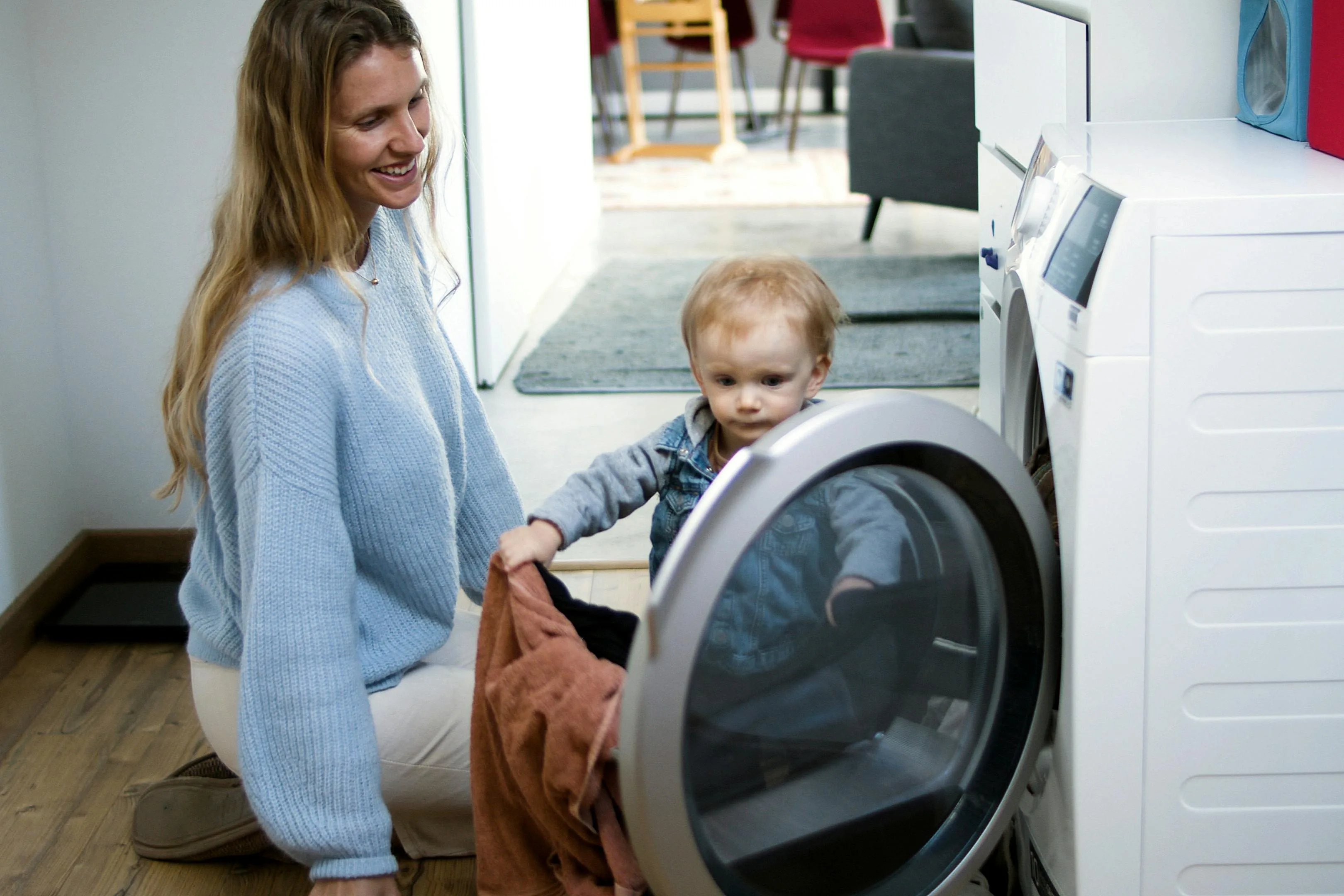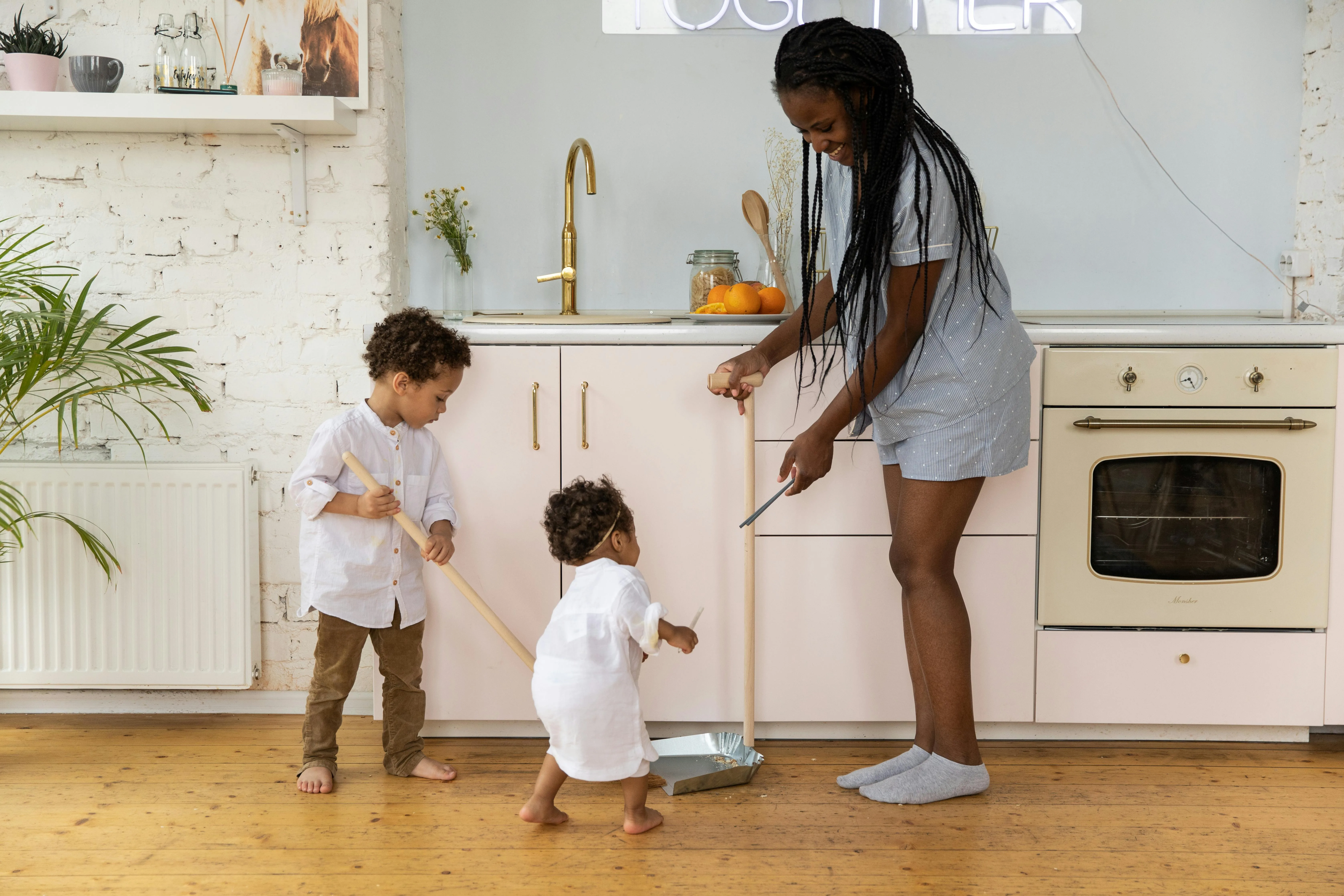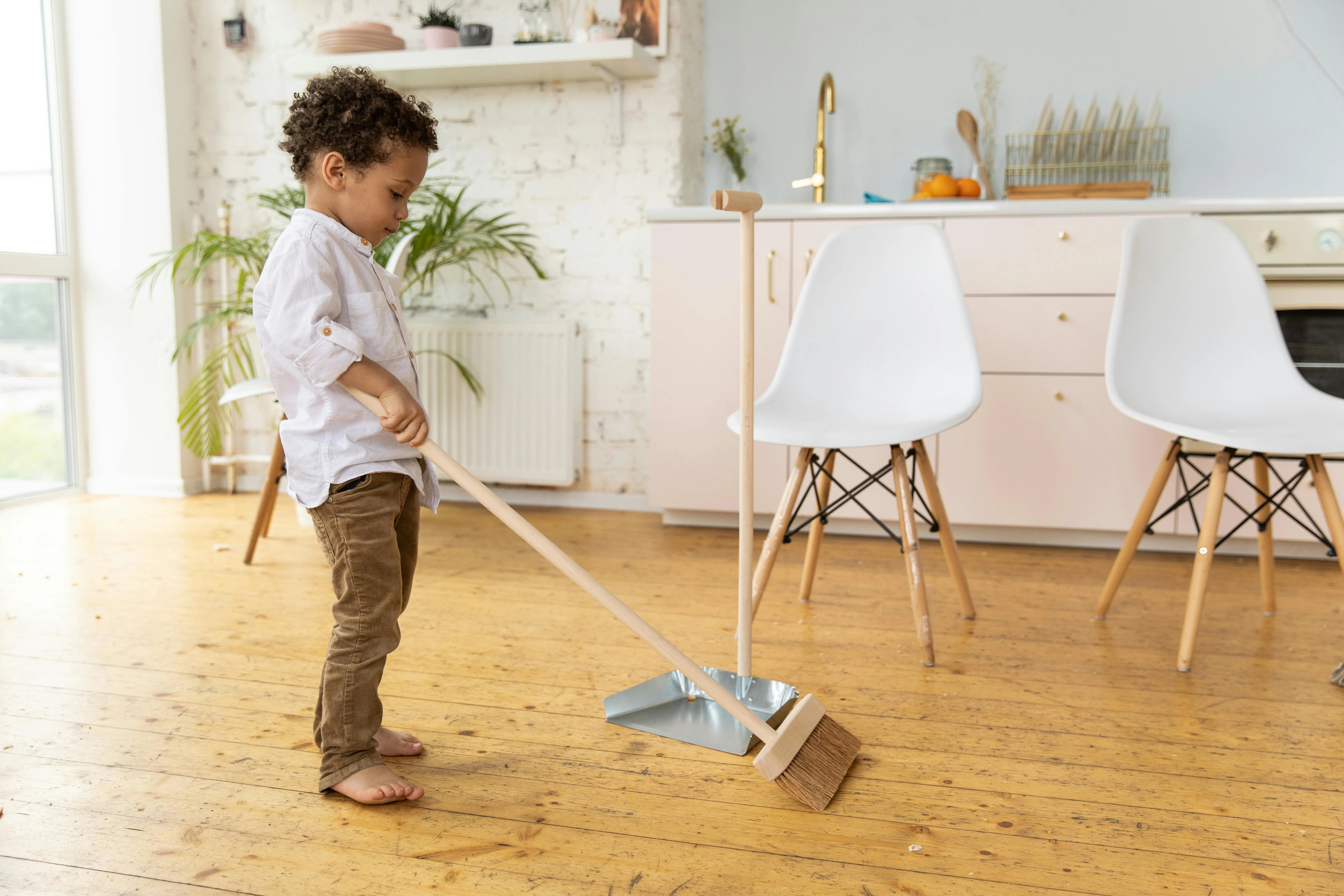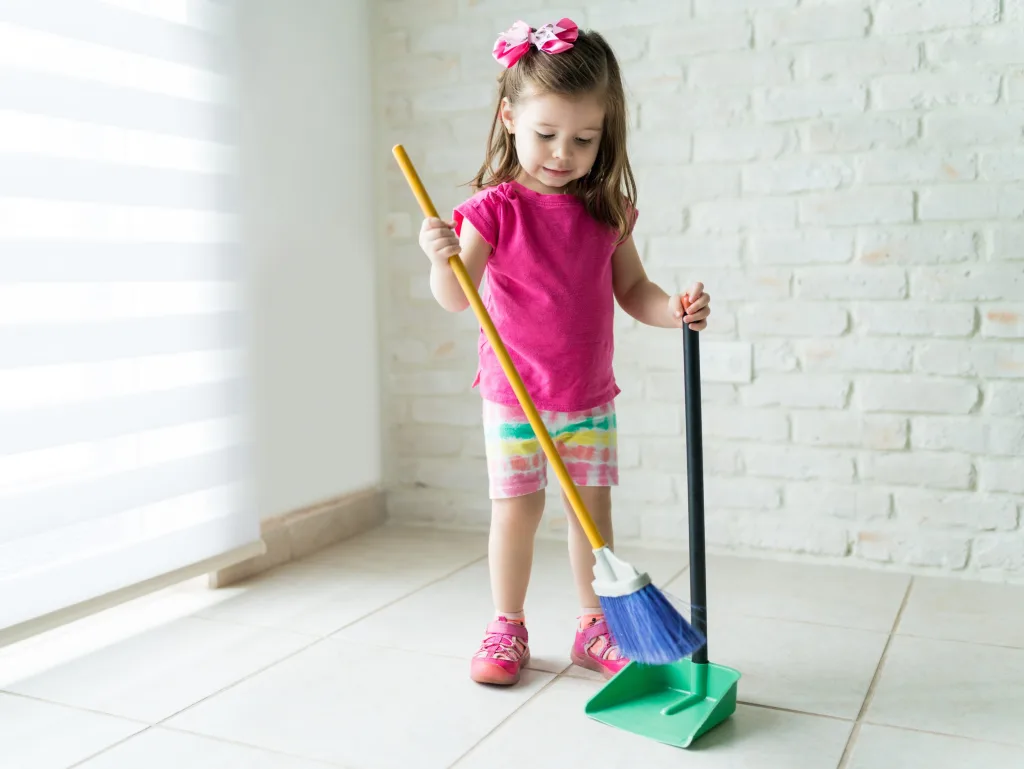Your little one might not be ready to mop floors or chop veggies, but finding even small chores for toddlers to do can have big benefits. In fact, research shows that helping out around the house helps young kids do better socially and academically. Plus, it boosts their self-confidence, helps them develop good routines, and instills a sense of responsibility.
Of course, with everything you juggle as a parent, finding toddler-friendly chores can feel like a chore in and of itself. That’s why we’ve got you covered with age-appropriate household tasks that munchkins ages two to four can manage, plus tips on creating an easy-to-follow toddler chore chart.
Au Pair Tip: If you’re hosting an Au Pair, they can support you in teaching your children to do chores. Give your Au Pair a list of easy chores for toddlers (heck, shoot them the link to this post if you want), and discuss the types of tasks your children already enjoy.
Age-Appropriate Chores for Toddlers
Even though young toddlers aren’t ready for real responsibility, they still love pitching in! It helps them feel connected to their family and can be a lot of fun. As toddlers get older (usually around age three), they start to understand the concept of responsibility. So long as you keep safety and capabilities in mind, there are plenty of age-appropriate chores for your little helper.
Chores for 2-year-olds
Chores for 2-year-olds should be simple, safe, and fun! This is an age where children love to copy adults, so aim for easy chores that help them feel included, like:
- Putting toys away
- Cleaning up small spills
- Supervising pet mealtime
- Putting trash in the waste bin
- Putting dirty laundry in the hamper
At this age, your tot won’t necessarily ease your chore load. However, giving them these low-lift tasks can boost their confidence and help them feel like they’re an integral part of the family unit.
Chores for toddlers (Ages 2-4)
In this age range, toddlers begin to develop fine motor skills. They can handle small household objects and tools with more command. They become more receptive to the concept of responsibility. Here are some great chores for tots ages 2 to 4:
- Setting the table (soft items only, like napkins and plastic cups)
- Watering plants
- Making their bed
- Dusting/wiping down surfaces
- Sorting clean laundry
- Basic meal prep (like mashing avocado with a spoon)
- Unloading the dishwasher (handing you items)
You can also ask your toddler what they’d like to help with, giving them more agency in the process. Every toddler develops at a different pace and has different interests, so see which chores appeal the most to your little one.
10 Simple and Fun Chores for Toddlers
Toddlers can’t clean the house like professionals. But finding fun and easy ways to include them in chores can teach them long-term responsibility. Our toddler chore chart includes age-appropriate ideas to build your kiddo’s confidence and a healthy routine.
Hosting an Au Pair? Ask them to work these chores into their time with your toddlers. Little ones often see an Au Pair as a friend, which can make chore time feel more like a fun time! Plus, you might return to a tidier home.
1. Sweeping & mopping
Sweeping and mopping are simple chores for toddlers to tackle. While they won’t be expert sweepers or moppers, they’ll learn that they have an obligation to clean up after themselves.
Au Pair Tip: Ask your Au Pair to have your kids clean up their own messes (rather than cleaning up after them).
2. Picking up their own toys
If your hallways are littered with toys, you might be tempted to pick them up as you walk by. Try to encourage your toddler to clean up their own toys instead. Here’s a simple cleanup rule to try: your tot can’t bring out a new set of toys until they’ve put the others away. That incentivizes them to clean up because they can’t wait to take out the other toys!
Au Pair Tip: Your Au Pair can clean-up time fun by turning it into a game. (Check out the “Strategies” section below).
3. Feeding and brushing
Want to strengthen your kid’s bond with pets while teaching them about animal care and empathy? Invite them to join in feeding and grooming your furry friends. They can scoop the food out of the bag, gently brush pets’ fur, and refill water bowls.
Au Pair Tip: Au Pairs can supervise a child’s pet care responsibilities. Be sure your Au Pair knows your family’s pet rules and what jobs your little one is allowed to do.

4. Dusting
There’s a good chance your munchkin already has practiced this chore while playing house. Give them a toddler-sized broom and pan, and have them sweep up small dry messes. You might even find that they start looking for areas to sweep all on their own!
Au Pair Tip: Ask your Au Pair to help the kids keep up with dusting. That knocks one chore off your weekly list–or at least shortens the time you spend doing it yourself! Be sure to let your Au Pair know about things your child should not dust, such as delicate objects.
5. Vacuuming (or mimicking vacuuming)
Most toddlers love watching dust and debris disappear after a vacuum goes over it — it’s like a magic trick! So you shouldn’t struggle to enlist your child in this chore. You can give them a small, handheld vacuum or the crevice attachment for your regular vacuum to clean up messy areas.
Au Pair Tip: Ask your Au Pair to help the kids vacuum their bedroom and play areas, and encourage your Au Pair to have the kids vacuum whenever they make a mess.
6. Making beds
A toddler is too small to lift a mattress and tuck in fitted sheets. But you can place them on the bed and have them spread the sheets and blankets out. Plus, they can arrange throw pillows or stuffed animals on top of the comforter.
Au Pair Tip: Have your Au Pair check that your little ones make their beds each morning. They can assist them with the tough stuff, like lifting the mattress, and encourage them to make the finished product look as tidy as possible.
7. Helping with laundry
While your toddler can’t operate the washer and dryer, they can help organize and transfer laundry. Ask them to pick up dirty laundry and put it in the basket or carry small loads to the machines. When laundry is clean, your tot can help fold or sort it.
Au Pair Tip: Asking your Au Pair to make sure the kids’ clean clothes get put away can be a lifesaver! Have them spend at least five minutes each morning or evening supervising toddlers as they put away their clothing, and telling them what a good job they’re doing.

8. Cleaning dishes
Toddlers love playing with water, so this is the perfect time to teach them how to clean dishes! Obviously, you’ll want to stick to plastic silverware for safety reasons, but you can show them how to handwash dishes or simply how to load them in the dishwasher.
Au Pair Tip: Be sure to teach your Au Pair about your kitchen safety rules. If you don’t want your kids standing on a chair to do the dishes, this is something your Au Pair should know. You can invest in a learning tower or build one if you’re concerned about safety.
9. Cleaning the bathrooms
Some of the simplest bathroom chores include wiping down surfaces, putting away bath toys, and wiping down the shower. There are some safety concerns in the bathroom, like slippery surfaces and chemical products. Look for toxin-free, organic, baby-safe cleaning products and monitor your toddler so they don’t climb on top of the toilet or counters.
Au Pair Tip: Be sure your Au Pair knows which cleaning products are safe for your child to use. Ask them to supervise when your kid is cleaning the bathroom, to prevent any potential slips or falls.
10. Taking out trash
Toddlers won’t be able to carry full kitchen trash bags. However, they can usually handle small bathroom bin bags. You can also ask them to let you know when a trash can is full.
Au Pair Tip: Make sure your child knows to inform the Au Pair when a trash bin is full. Ask your Au Pair to reward/praise them for keeping track of the full trash bins and for assisting in taking bags out to the street bins.
How to Create a Toddler Chore Chart
Toddlers are visual learners and respond well to cheery colors and images. So, a chore chart is the perfect way to help them track what tasks they’ve done and what still needs to be completed. Toddlers younger than 3 years of age might not grasp the concept of record keeping just yet, but after age 3, most are able to understand it. Here are some tips for creating a chore chart:
- Decide on a format. You might print out a new chart each week, use a dry-erase board, or try a magnetic chart with compatible pieces that mark the progress. If your tot is at that phase when they’re obsessed with your iPad or tablet, you can keep the chart there and review it together.
- Use pictures to represent the tasks. Your little helper likely can’t read yet, so make sure to use images for each task. This might include a trash bin for taking out the trash, a plate with silverware for setting the table, and a broom for sweeping.
- Choose how you’ll mark their progress. You might simply create a tally mark for each time your kid completes a task. Or, you might have an empty box for each day of the week, under each task, adding a star or sticker for every day your kid completes the chore.
- Create a reward system. This might involve giving your kid a new sticker booklet each time they do a chore, every day of the week for a full week. Alternatively, you might reward them more frequently by giving them a treat every time they do a chore.
You might even be able to get your toddler to use the chart! If you hang it up at their height, they can add a mark or a sticker each time they complete a task themselves.

Strategies for Getting the Most Out of Your Toddler Chore Chart
Choosing easy chores is the first step to getting your toddlers to help out. But sometimes, the ease of the task isn’t enough to get them to engage in it. Having strategies for encouraging your child’s involvement can be a big help.
1. Make it a game
Turning cleaning into a game can help your kids get chores done in no time. You can turn picking up toys into a race. Set a timer and see if the kids can beat the timer. Be sure to keep the clean-up area small enough for your children to easily win (try 1-2 minutes). Another option is to pretend the basket/box the toys go in is a train, and the toys are the passengers. Slowly move the vessel around, making the appropriate sounds like “choo-choo,” and tell your tot that the passengers have to hop in before the train leaves the station.
Au Pair Tip: Encourage your Au Pair to think of creative clean-up games. Ask them to make this a focus during their time with the kids. Coming home to a clean house not only means more time to spend with your family instead of cleaning, but it also means your kids are learning to be responsible for themselves while you’re away
2. Get kid-sized cleaning supplies
Kids love things sized just for them. Child-sized cleaning tools are easy to use and help toddlers take pride in their belongings. If you’re going to have your kids sweeping, dusting, or mopping, make sure to get them child-friendly supplies.
Au Pair Tip: Make sure your Au Pair knows where the cleaning supplies are and which ones are safe for kids to use. Have them encourage little ones to spend a few minutes a day practicing cleaning.
3. Start a reward system and give lots of praise
Toddlers, like most people, are more likely to repeat a task if it’s fun and rewarding. So make sure to give kids plenty of praise, even for small accomplishments. Have a clear and simple rewards system so kids can know how close they are to winning that exciting toy or treat!
Au Pair Tip: Ask your Au Pair to keep you up to date on your toddler’s accomplishments and to fill out your toddler’s chore chart. When you get home, your Au Pair and your kids can tell you about their day. Then, you can celebrate a second time!
4. Keep tasks small
Toddlers have such a short attention span and, easily become tired and frustrated. They’re much more likely to finish a chore if the task is small. Try not to assign them a chore that will take more than 10 minutes (ideally, no more than five).
Au Pair Tip: Ask your Au Pair to tell you where the kids struggle the most. Then, together, you can determine whether your chore expectations are in line with your child’s abilities.

5. Don’t force it
Sometimes, your child might be too tired or frustrated to help. Instead of forcing the issue, encourage them to take a break and come back when the chore sounds fun again.
Au Pair Tip: Be sure your Au Pair understands that young kids only have an attention span of a few minutes, and to be patient when kids get bored with a task. It’s better for them to have fun cleaning than it is to force it.
6. Make it a regular habit
The more regularly kids clean up, the easier it will become. Encourage a solid routine by explaining the value of a clean home, like how easy it is to find their toys, and how nice it is to have a clean space to play.
Practicing the same chores daily will also help your little one get better at each task. Eventually, they’ll be able to accomplish chores on their own, and you can add more responsibility as they get older.
Au Pair Tip: Ask your Au Pair to make this part of their daily routine with the kids. Work together to create a schedule that leaves time for quick, 5-minute chores throughout the day.
Start Your Toddler’s Journey to Self-Sufficiency with the Support of Go Au Pair!
Put your toddler on the path to confidence and self-sufficiency by giving them age-appropriate chores! A chore chart can help you and your cutie track their progress, while a rewards system can keep them motivated. With your Au Pair, you can devise ways to make housekeeping tasks more fun, from turning chores into games to praising small achievements.
Like with all things in child-rearing, consistency is key. An Aur Pair can help ensure your tot is keeping up with their cleaning routines, updating you on their accomplishments, and finetuning strategies to keep them engaged. Find an Au Pair to help keep your kiddo on track with chores, and browse our roster of highly qualified individuals. If you’re curious about how we vet applicants and pair Au Pairs with Host families, you can learn all about our process from one of our helpful representatives. Contact Go Au Pair today and welcome a member into your household who shares your values and your passion for children’s wellbeing!



